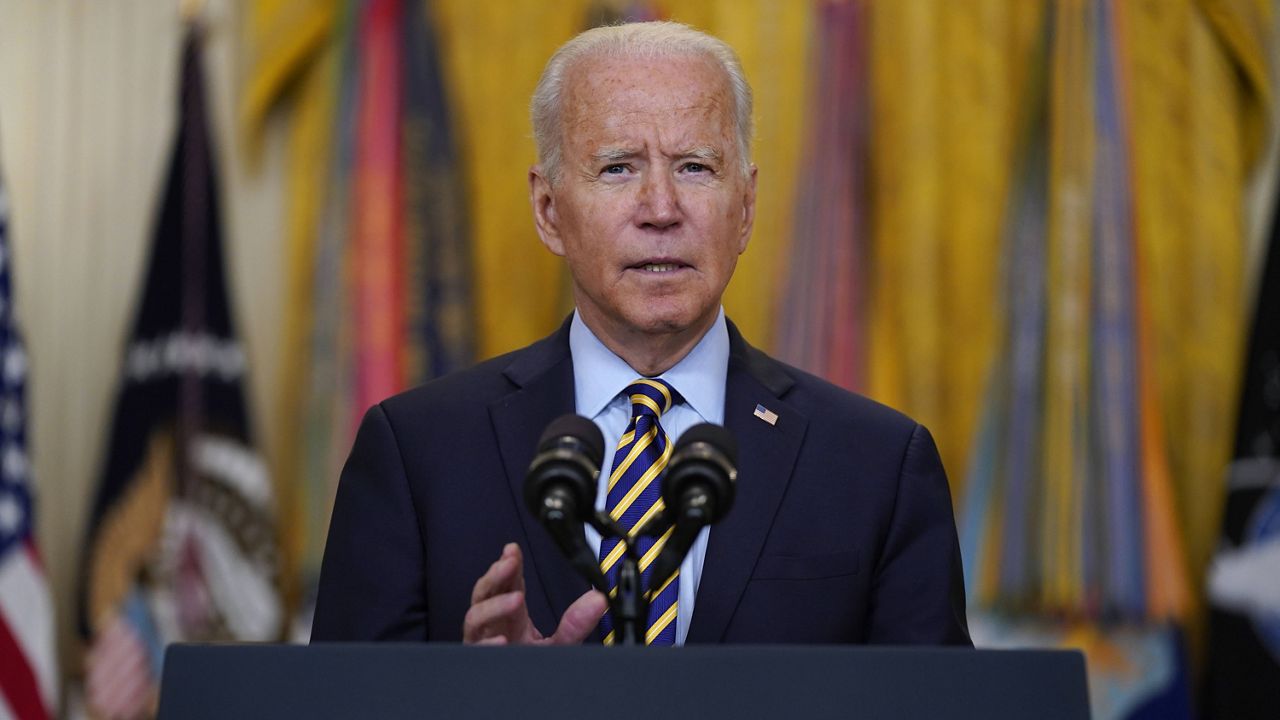President Joe Biden said Thursday that the U.S. withdrawal from Afghanistan will be complete by Aug. 31, slightly ahead of his Sept. 11 goal, in a speech that marked the final chapter of America’s drawdown from the 20-year-long conflict and a handoff of responsibility to Afghan leaders and its military.
What You Need To Know
- President Joe Biden said Thursday that the U.S. withdrawal from Afghanistan will be complete by Aug. 31, slightly ahead of his Sept. 11 goal
- In remarks from the White House East Room, the president defended his reasoning behind the decision to leave Afghanistan
- He said, “The United States did what we wanted to do in Afghanistan: get the terrorists who attacked us on 9/11”
- The president also denied reports that the capital of Kabul could fall within six months after the last U.S. soldiers leave, reiterating that Afghan forces have the ability to sustain the government
In passionate remarks from the White House East Room, the president defended his reasoning behind the decision to leave Afghanistan, outlined the effort to train Afghans to take American soldiers’ place and announced a plan to relocate local interpreters and others who aided the U.S. in combat.
“The United States did what we wanted to do in Afghanistan: get the terrorists who attacked us on 9/11,” he said, later adding: “The status quo was not an option. Staying would have made us choose taking casualties — American men and women.”
Biden previously announced in mid-April his goal of withdrawing nearly all American troops by the 20th anniversary of the 9/11 attacks, noting that he was the fourth president to oversee the war in Afghanistan and promising not to pass the conflict on to a fifth.
On Thursday, he stressed the need to preserve U.S. lives and protect American troops from enduring future conflict "with no reasonable expectation of achieving a different outcome."
Officials had announced Tuesday that the military withdrawal was 90% complete, even as the Taliban gains control of more districts in the country, taking over more of northern Afghanistan this week and sending Afghan troops to flee across the border.
On Thursday, the president denied reports that the capital of Kabul could fall within six months after the last U.S. soldiers leave, reiterating that Afghan security forces have the ability to sustain the government. He said the United States would not be responsible for Afghan lives lost after the withdrawal because Afghan leaders are now in charge of their people’s fate.
“Afghan leaders have to come together and drive toward a future that the Afghan people want and they deserve,” Biden said.
Biden said the U.S. would now turn to a diplomatic effort in the country to reach “a peace agreement that will end this senseless violence.”
On Thursday, President Biden acknowledged that the Taliban were at their "strongest militarily since 2001" but he expressed confidence in the Afghan security forces, many trained by Americans, who he called "better trained, better equipped and more competent in terms of conducting war."
It was clear soon after the April announcement that the U.S. was ending its “forever war” that the departure of U.S. soldiers and their estimated 7,000 NATO allies would be nearer to July 4, when America celebrates its Independence Day.
In the middle of the night last week and without telling its new commander, American soldiers withdrew from Bagram Airfield, an epicenter of U.S. involvement in Afghanistan, quietly completing a handover to Afghan security forces.
At its peak, Bagram Airfield saw more than 100,000 U.S. troops pass through its sprawling compound barely an hour's drive north of Kabul.
Most NATO soldiers had already quietly exited as of last week.
The final stage of the withdrawal now leaves urgent questions about the fate of interpreters and other Afghans who worked alongside U.S. soldiers in combat, thousands of whom are still in the country and often receive death threats from the Taliban.
On Thursday, Biden confirmed U.S. support for those allies and said that plans for their evacuation out of the country were in the works, though he did not provide new details about the scope of the evacuation.
“There is a home for you in the United States if you so choose,” the president said. “We will stand with you, just as you stood with us.”
Biden said that Afghan allies will be flown out of the country starting this month to “U.S. facilities” outside of the continental United States as well as third countries. The intention is for those allies to wait in a safe place while their American visas are processed.
The White House has not confirmed reports that the group could be evacuated to Central Asian countries, and advocates have called for relocation to a U.S. territory like Guam, where visa processing may happen more quickly.
But it’s still unclear if all interpreters will be included. More than 18,000 Afghans have applied for protection through the special U.S. visa meant to help military allies, but many are still in the very beginning stages of the application process, and approvals typically take years.
“If the Americans withdraw from Afghanistan even for a minute, I cannot guarantee I can be alive,” said a former interpreter named Omid, who spoke to Spectrum News from Kabul last month.
Before the president's Thursday announcement, the U.S. had previously refused to say when the last U.S. soldier would leave Afghanistan, citing security concerns. For now, the protection of Kabul's Hamid Karzai International Airport is still being negotiated. Turkish and U.S. soldiers were protecting the airport as of last week.
After August 31, the U.S. will also have about 650 troops in Afghanistan to protect its sprawling embassy in the capital.



